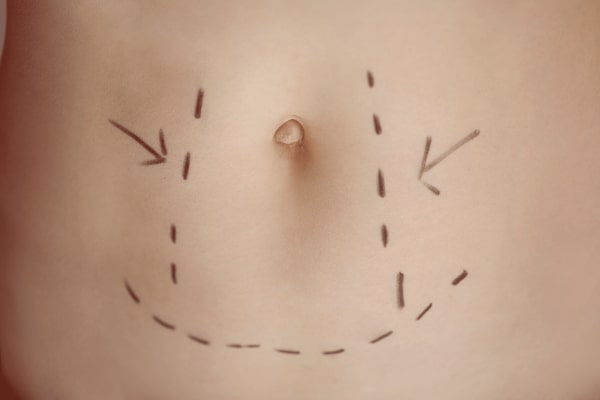Significant weight loss of 50 or 100 pounds or more is a huge achievement. Not only is the physical process difficult in its own right, but the emotional transformation can be equally challenging.
One thing many men and women struggle with after a massive drop in weight is the way they see themselves when they look in the mirror. Though one certainly deserves to feel a deep sense of accomplishment, ironically, many individuals end up feeling conflicting emotions. For instance, past weight loss patients have emphasized feeling extremely vulnerable about their new shape, fearful about gaining the weight back, and upset about loose skin.
Dealing with these emotions is an essential part of going through the weight loss process. In addition, many patients turn to plastic surgery to help them achieve their goals. Most attain outstanding results in doing so.
Plastic surgery after weight loss usually addresses issues such as loose excess skin, stubborn fat, sagging breasts, and skin wrinkles.
If you have recently lost a lot of weight or are in the middle of your weight loss journey and looking ahead, there are many procedures that can help you feel like yourself again. If you’re new to plastic surgery, however, you may have a lot of questions.
So, below, we’ve outlined the top eight things we think you should know about getting plastic surgery after weight loss. Before we dive right in to those, however, let’s take a look at the top surgeries patients tend to seek after significant weight loss.
Top Post-Weight Loss Plastic Surgeries

Tummy Tuck Surgery
Tummy tuck surgery (abdominoplasty) is one of the most popular plastic surgery procedures after massive weight loss. This procedure removes loose sagging skin from the abdomen and around the trunk.
Liposuction
Even after significant fat loss through weight loss surgery or diet and exercise alone, stubborn fat can resist your efforts. Fortunately, these pockets of stubborn fat cells can be removed via liposuction. Keep in mind, however, that liposuction is not a weight loss procedure in itself.
Breast Lift Surgery
Breast lift surgery removes excess breast skin and tissue and corrects drooping, sagging breasts. This procedure does not add volume to the breasts, but utilizes the tissue you already have to create a more youthful, attractive figure.
Breast Augmentation
If, through your weight loss journey, you’ve found that you’ve lost volume in your breasts, breast augmentation can replenish this volume with silicone or saline implants.
Upper Body Lift
It’s common to have loose skin on the upper back and sides of the chest after weight loss. This excess skin can be removed with an upper body lift.
Lower Body Lift
This procedure is sometimes called circumferential abdominoplasty as it involves abdominoplasty (tummy tuck surgery) to remove excess skin from around the stomach, but it also includes an outer thigh lift and a buttock lift. The procedure removes all loose skin in these areas and contours your body generally, for a more attractive silhouette.
Other Procedures
Depending on your needs after weight loss, there are several other plastic surgeries that can help contour your body and return your confidence. These include:
- Brazilian butt lift surgery
- Male breast reduction surgery
- Breast reduction surgery
- Thigh lift
- Arm lift
- Face and neck lift
Things to Know About Plastic Surgery After Weight Loss
Keep the following in mind as you research plastic surgery after fat loss.
1) You should be at or near your goal weight prior to surgery.
It’s not uncommon for patients to be thinking about plastic surgery right away as soon as they start losing weight. This is great! It shows that you are dedicated to your weight loss journey and excited about the future.
However, it’s important that we perform plastic surgery after medical weight loss safely and for maximum effectiveness. This means you must achieve your goal weight before moving ahead with cosmetic surgery. Furthermore, you should maintain that weight for at least six months prior to any body contouring procedures.
2) It’s important to wait at least a year after weight loss surgery before considering plastic surgery.
For those patients who underwent a weight loss surgery to lose excess weight, it’s important to wait at least one year after this procedure before moving forward with plastic surgery.
Not only will this time be required to actually drop your excess weight, but you also want to give your body adequate time to heal from your gastric bypass or related surgery before undergoing an additional invasive procedure such as a tummy tuck or an upper body lift.
3) Be sure you’re following a balanced, healthy diet.
Patients should be in good overall health before moving forward with plastic surgery, and this means taking care of your diet. Nutritional counseling may be performed to ensure you’re getting enough nutrients, vitamins, protein, etc. as these factors can influence how your body handles cosmetic surgery and how well you heal after your procedure.
4) Chronic medical conditions may prohibit you from getting surgery.
Those patients who struggle with diabetes, heart disease, or other chronic conditions may be prohibited from body contouring procedures for their own safety. You can discuss these issues with your family doctor as well as a plastic surgeon to know what’s right and safe for you.
5) Scarring is inevitable with most post-weight loss surgeries.
Patients should have realistic expectations concerning the outcomes of their body contouring surgery. For the most part, this means realizing that you’re going to have scarring. Excess skin can only be removed with incisions, and incisions result with a patient having some scars after weight loss surgery.
Fortunately, highly skilled plastic surgeons can hide these incisions within skin folds or other areas that will make the scars difficult to notice. Furthermore, when well-healed, even larger scars will flatten and fade eventually.
6) For women, it’s best to be done having children prior to surgery.
Getting pregnant after a tummy tuck or similar surgery is not dangerous, but it may diminish your results. This is because, with a tummy tuck, for example, we’re removing excess skin. So, if you were to get pregnant, that skin would re-stretch, possibly negating the positive effects of your tummy tuck.
7) Your recovery time may be significant, so plan accordingly.
After serious plastic surgeries such as tummy tucks, breast augmentations, or lower body lifts, you’ll need to take off several weeks from work so that you can fully recover. Furthermore, you’ll need to avoid exercising, smoking, drinking, and other taxing activities for an extended period of time in order to give your body adequate rest and time to heal.
8) Some procedures may require an overnight stay in a hospital.
These days, many plastic surgeries can be performed in-office and are outpatient, which means the patient can return home on the same day as their procedure. However, more significant plastic surgeries like lower body lifts, upper body lifts, and combination procedures will require overnight stays in the hospital.
Is Plastic Surgery After Weight Loss Covered by Insurance?

In addition to breast reduction surgery, sometimes, panniculectomies are covered by insurance. This procedure removes a fold of excess skin (pannus) that can hang over the front of the abdomen. It is not necessarily a tummy tuck, however, as tummy tuck surgery also involves the removal of excess abdominal skin and tightens the ab muscles in addition to other improvements.
Other procedures that are only for aesthetic purposes may not be covered by insurance. All health insurance companies have different policies regarding plastic surgery.
Schedule Your Consultation Today
Have you lost a large amount of weight? Congratulations! Now, it’s time to take your physique to the next level and consider a body contouring surgery or breast procedure. Look your best and feel your best!
Contact our New York City office today to schedule a consultation appointment with board-certified plastic surgeon Dr. Matthew Schulman.
References



